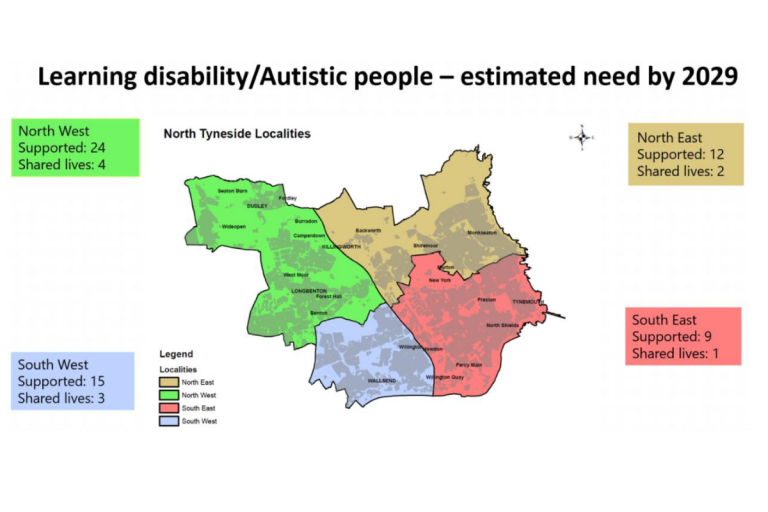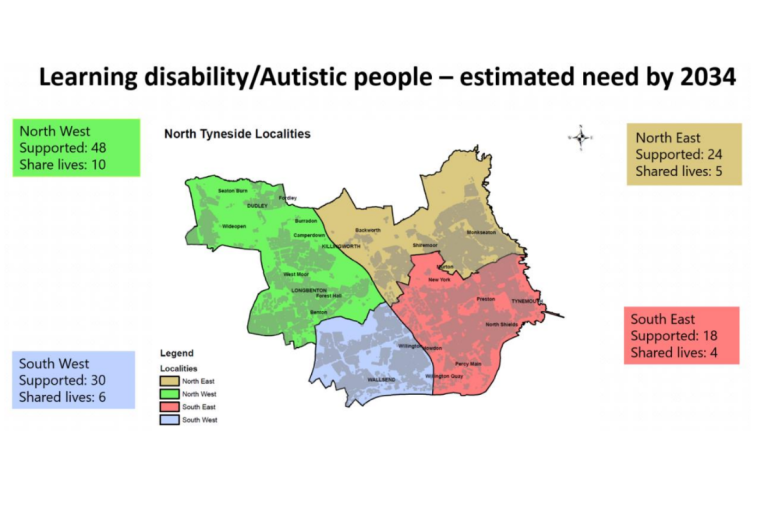People with a learning disability/Autistic people
6.1 Headlines
- There are an estimated 887 people aged 18+ years with a learning disability and/or Autistic people living in North Tyneside, who are eligible for adult social care support from the Council as at 2023/2024.
- The 18+ population of people with a learning disability/Autistic people is projected to increase to 926 people by 2029 and 964 people by 2034.
- c.52% of people with a learning disability and/or Autistic people are either living with family and friends (36%) or in mainstream housing (16%).
- Currently 8% of people with a learning disability and/or Autistic people live in care homes, 3% live in Shared Lives settings and 37% live in supported housing.
6.2 What local people are seeking
People are seeking homes with proximity to local amenities and services as well as a good sense of community and access to green public and private space.
Ideally, people would like to live in areas with a low density of traffic/cars. Locational factors often drive decision making when choosing where to live.
Desired areas include Wallsend and coastal regions like Tynemouth and Whitley Bay.
In relation to existing provision of supported housing, much of this is in the form of shared supported housing with varying levels of onsite support, where tenants have a bedroom but share the communal facilities with other tenants.
Some people say that shared supported housing can work in some circumstances, for example young people who may wish to share with other young people or to provide short term intensive support following hospital discharge.
A majority of people with a learning disability and/or Autistic people who may want or may need to live in, supported housing, are increasingly seeking self-contained supported accommodation but with communal space/s that provides an opportunity for residents to socialise with each other/with friends and family members, avoiding social isolation.
6.3 Housing priorities
The Council’s policy is to support people with a learning disability and/or Autistic people to live and be supported in the community as far as possible and that supported housing is key component of enabling this to happen.
There is a desire to develop a housing pathway which includes a mix of types housing and supported accommodation, which offer people different housing choices, from housing options with 24/7 support through to access to mainstream housing with packages of care/support tailored to individuals’ needs.
There needs to be a mix of types of supported housing which enables people to have housing choices. This will include self-contained supported housing as well as shared supported housing.
Council and NHS commissioners want to reduce the use of residential care as this is not an option wanted by the majority of people with a learning disability and Autistic people. For some people a move to shared supported housing or self-contained supported housing from residential care may be a preferred option.
There is a need for small ‘clusters’ of self-contained supported housing (8-10 flats) including with communal space, both for people who need 24/7 support and for people with lower support needs. For example, North Tyneside has some very effective core and cluster models, which support people with a learning disability and Autistic people, with a mix of flats, smaller houses and bungalows.
There is a need to review the existing stock of shared supported housing for people with a learning disability and/or Autistic people. It is likely that some of this accommodation may not be suited for use as supported housing however some of this accommodation may need to be repurposed to meet current and future housing needs. This will influence the amount of additional supported housing required.
There is a need for an increased range of tenure choices, such as home ownership through the Home Ownership for people with Long Term Disabilities (HOLD) scheme, where this appropriate to people’s housing and care/support needs.
There is a need for supported housing with lower rent and service charges to enable people to access employment opportunities, where this is appropriate to people’s needs and preferences.
People with a learning disability and Autistic people need to be able to better access mainstream general needs housing within the wider community. This can be a realistic option for people where floating support or individualised care/support packages are provided.
6.4 Evidence of need and the Council's Commissioning intentions
In summary, based on the needs assessment, it is estimated that:
- an additional c.60 units of supported housing and c.10 shared lives places are needed by 2029;
- an additional c.120 units of supported housing and c.25 shared lives places are needed by 2034.
The map below indicates the estimated need by North Tyneside Locality by 2029 and 2034.


There is mostly a need for self-contained accommodation. Shared supported housing does have a role in some cases, but it needs to be clear it is not typically a permanent housing solution.
The Council will commission small ‘clusters’ of self-contained supported housing (8-10 flats) including with communal space, both for people who need 24/7 support and for people with lower support needs alongside smaller houses and bungalows.
Shared Lives options will be increased as a complementary housing offer alongside supported housing or individuals accessing mainstream housing.
There is a need for a small number of specialist and supported housing/accommodation schemes for people with the most complex care and support needs, including 24/7 support needs, which, for example, can also provide ‘step down’ accommodation for people being discharged from inpatient or care home settings.
For example, the Council would be interested in developing some specialist small bedded residential homes, for some people with a learning disability/Autistic people, to support mental health and acute hospital discharge, with some nursing support on site. The maximum size would be 6-8 beds, and the Council would be looking for the environment to be designed to support people with dementia, eating disorders, complex Autism or learning disability where service users are likely to need their own mini flats within a larger residential unit. With a separate unit for females particularly with a forensic history. The Council would welcome if they were developed to provide short break residential within the same settings.
